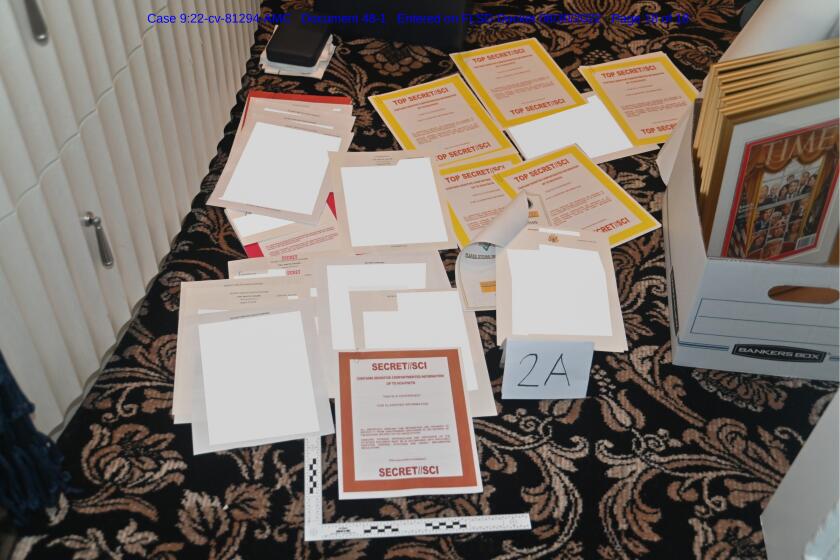Justice Department asks appeals court for access to classified documents in Trump case

- Share via
WASHINGTON — The Department of Justice has asked the 11th Circuit Court of Appeals in Atlanta to block a special master review of classified materials found at former President Trump’s Florida home and to allow the department to continue using the documents as part of its investigation while the third-party arbiter reviews other recovered documents.
The department had already appealed U.S. District Judge Aileen Cannon’s decision to appoint a special master to review more than 11,000 records seized during the Aug. 8 search of the property by the FBI.
Friday’s request is narrowly focused on the judge’s decision to have the special master evaluate the approximately 100 classified records found in the search and to prevent the department from using the documents in its ongoing investigation until the review is complete — which could take months.
“The district court has entered an unprecedented order enjoining the Executive Branch’s use of its own highly classified records in a criminal investigation with direct implications for national security,” the filing states.
The motion also says that although the Justice Department believes Cannon “fundamentally erred in appointing a special master and granting injunctive relief, the government seeks to stay only the portions of the order causing the most serious and immediate harm to the government and the public.”
On Thursday, Cannon named Raymond Dearie, a senior judge of the U.S. District Court for the Eastern District of New York, as special master, and gave him access to the full cache of around 11,000 records seized from Trump’s property.
The Justice Department objected, saying that Dearie need not review classified records because Trump has no claim of privilege over classified material belonging to the government.
Dearie issued an order Friday summoning the parties to the federal district courthouse in Brooklyn, N.Y., for a preliminary conference Tuesday.
For the record:
10:40 a.m. Sept. 20, 2022A previous version of this article said that former President Trump’s lawyers were not required to have security clearances to examine classified information as part of the special master review. The district court judge wrote in her order that the lawyers have to meet security clearance requirements.
Cannon’s order also gives Trump’s legal team access to the classified records, with a stipulation that the team meet security clearance requirements. The department questioned that decision in its filing, noting that some of the recovered documents had markings reflecting “the highest levels of classification and extremely restricted distribution.”
The motion states that “the district court here ordered disclosure of highly sensitive material to a special master and to Plaintiff’s counsel — potentially including witnesses to relevant events — in the midst of an investigation, where no charges have been brought.”
The special master is supposed to set aside and evaluate any materials that might be protected from the investigation by claims of attorney-client or executive privilege.
Cannon agreed to allow the intelligence community to continue a national security review of the documents, but enjoined the Justice Department from using the materials for its investigation or to bring charges until the special master’s review is complete. She dismissed the Justice Department’s argument that it is unworkable to separate the criminal investigation from the national security review because the FBI plays a leading role in both.
The department said Friday that Cannon’s ruling hamstrings the national security review and “irreparably harms the government by enjoining critical steps of an ongoing criminal investigation and needlessly compelling disclosure of highly sensitive records, including to [Trump’s] counsel.”
News of hundreds of missing classified documents recovered from former President Trump’s home has the intelligence community reeling and the public asking: “How could it happen?”
Cannon’s order said that the Justice Department had failed to show immediate harm to national security if the department cannot access the classified information. In its motion Friday, the department said the judge had ignored the evidence it provided.
“Disregarding a sworn declaration from a senior FBI official, the court dismissed such concerns as ‘hypothetical scenarios’ and faulted the government for not identifying an ‘emergency’ or ‘imminent disclosure of classified information,’” the motion states.
The Justice Department said that materials were stored at Mar-a-Lago “in an unsecure manner over a prolonged period” and that improper disclosures of classified information “might have occurred or may still occur.”
In its filing, the department said Cannon’s order was preventing FBI investigators from working to determine what was in the dozens of empty folders marked “Classified” that were found in Trump’s office and a storage room, as well as the investigators’ effort “to assess which if any records were in fact disclosed, to whom, and in what circumstances.”
The Justice Department has said a special master is not necessary, in part because officials had already completed a review of documents potentially subject to attorney-client privilege and set them aside. It has also argued that a special master should not resolve claims of executive privilege.
The filing also points out that although Trump’s lawyers argue he had the ability when he was president to declassify the documents that were later recovered in the search, they never say he actually did so — and Cannon’s opinion is based on that assumption, with no evidence in the record to support it.
“The court erred in granting extraordinary relief based on unsubstantiated possibilities,” the department said in Friday’s motion.
More to Read
Get the L.A. Times Politics newsletter
Deeply reported insights into legislation, politics and policy from Sacramento, Washington and beyond. In your inbox three times per week.
You may occasionally receive promotional content from the Los Angeles Times.











